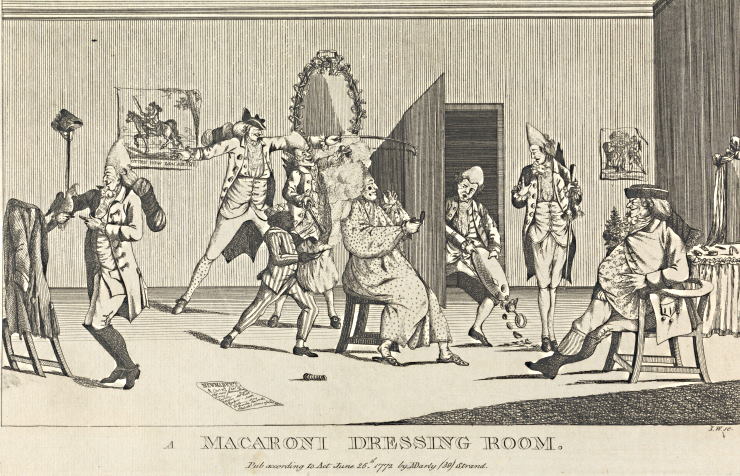From Historic UK:
ShareIn the mid-1760s, Europe had opened up again to English travellers following the end of the Seven Years’ War. Aristocratic young men returning from their ‘Grand Tour’ to Italy and France began to appear in London dressed in a distinctive, extravagant style that derived from French court dress. Their predilection for foreign food as well as fashion earned them the nickname of ‘macaronis’.
The term first appears in a letter written by the writer and wit Horace Walpole in 1764, in which he refers to the ‘Maccaroni Club’ – thought to be Almack’s – as the place where ‘all the travelled young men who wear long curls and spying-glasses’ gathered.
The macaroni ‘uniform’ included a slim, tight-fitting jacket with waistcoat and knee-length breeches, all made of silk or velvet in bright colours, and heavily embellished with delicate embroidery and lace. Patterned stockings and shoes with large diamond or paste buckles and high red heels were de rigeur.The correct accoutrements were crucial: Walpole had mentioned the quizzing glass or ‘spying-glass’, but other accessories included an enormous nosegay in the buttonhole of the jacket, oversized buttons, and numerous fobs, seals and watches hanging on chains. George FitzGerald, a nephew of the Earl of Bristol and a dedicated macaroni, carried egotistical display to its limits by wearing a miniature painting of himself pinned to his chest.
The defining feature of the macaroni look was the hairstyle. Almost all men wore curled and powdered wigs in the eighteenth century: it was estimated that in George III’s reign the British army used 6,500 tons of flour every year for wig powder. The macaronis were famous – or infamous – for their ‘high hair’.
The front part of the wig was brushed up vertically into a crest, jutting up to nine inches above the head, with side rolls and a thick ‘club’ of hair hanging down the back, tied with a black ribbon bow or confined in a ‘wig bag’. (Read more.)


















2 comments:
Would this have any connection to the line: "He [Yankee Doodle] stuck a feather in his cap and called it macaroni"?
Absolutely!
Post a Comment